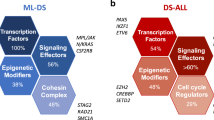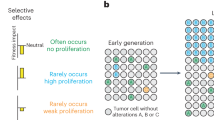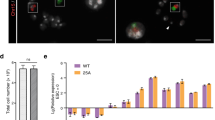Abstract
We have observed karyotypic changes involving the gain of chromosome 17q in three independent human embryonic stem (hES) cell lines on five independent occasions. A gain of chromosome 12 was seen occasionally. This implies that increased dosage of chromosome 17q and 12 gene(s) provides a selective advantage for the propagation of undifferentiated hES cells. These observations are instructive for the future application of hES cells in transplantation therapies in which the use of aneuploid cells could be detrimental.
This is a preview of subscription content, access via your institution
Access options
Subscribe to this journal
Receive 12 print issues and online access
$209.00 per year
only $17.42 per issue
Buy this article
- Purchase on Springer Link
- Instant access to full article PDF
Prices may be subject to local taxes which are calculated during checkout

Similar content being viewed by others
References
Amit, M. et al. Dev. Biol. 227, 271–278 (2000).
Reubinoff, B.E., Pera, M.F., Fong, C.Y., Trounson, A. & Bongso, A. Nat. Biotechnol. 18, 399–404 (2000).
Thomson, J.A. et al. Science 282, 1145–1147 (1998).
Draper, J.S., Pigott, C., Thomson, J.A. & Andrews, P.W. J. Anat. 200, 249–258 (2002).
Atkin, N.B. & Baker, M.C. Lancet 2, 1349 (1982).
Rodriguez, E. et al. Genes Chromosomes Cancer 8, 230–236 (1993).
Skotheim, R.I. et al. Cancer Res. 62, 2359–2364 (2002).
Longo, L., Bygrave, A., Grosveld, F.G. & Pandolfi, P.P. Transgenic Res. 6, 321–328 (1997).
Henderson, J.K. et al. Stem Cells 20, 329–337 (2002).
Westermann, F. & Schwab, M. Cancer Lett. 184, 127–147 (2002).
Chiou, S.K., Jones, M.K. & Tarnawski, A.S. Med. Sci. Monit. 9, PI25–29 (2003).
Burdon, T., Smith, A. & Savatier, P. Trends Cell Biol. 12, 432–438 (2002).
Chambers, I. et al. Cell 113, 643–655 (2003).
Mostert, M.C. et al. Oncogene 16, 2617–2627 (1998).
Liu, X. et al. Dev. Dyn. 209, 85–91 (1997).
Acknowledgements
This work was supported in part by grants from the Biotechnology and Biological Sciences Research Council, Wellcome Trust and Yorkshire Cancer Research. We thank Henry Yuen and the Oskar Rennebohm Foundation for their gifts to the University of Wisconsin Foundation that helped support this work.
Author information
Authors and Affiliations
Corresponding author
Ethics declarations
Competing interests
P.W.A. and J.S.D. have equity in Axordia, Ltd., a university spinout company dedicated to development of stem cell technology.
Supplementary information
Rights and permissions
About this article
Cite this article
Draper, J., Smith, K., Gokhale, P. et al. Recurrent gain of chromosomes 17q and 12 in cultured human embryonic stem cells. Nat Biotechnol 22, 53–54 (2004). https://doi.org/10.1038/nbt922
Received:
Accepted:
Published:
Issue Date:
DOI: https://doi.org/10.1038/nbt922
This article is cited by
-
Epigenetic repression of CHCHD2 enhances survival from single cell dissociation through attenuated Rho A kinase activity
Cellular and Molecular Life Sciences (2024)
-
IGF2BP1 induces neuroblastoma via a druggable feedforward loop with MYCN promoting 17q oncogene expression
Molecular Cancer (2023)
-
TPX2 Amplification-Driven Aberrant Mitosis in Culture Adapted Human Embryonic Stem Cells with gain of 20q11.21
Stem Cell Reviews and Reports (2023)
-
In vitro spermatogenesis in artificial testis: current knowledge and clinical implications for male infertility
Cell and Tissue Research (2023)
-
Complex biology of constitutional ring chromosomes structure and (in)stability revealed by somatic cell reprogramming
Scientific Reports (2021)



